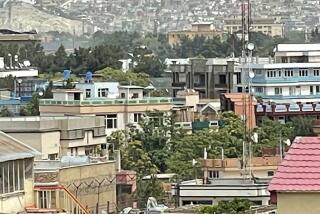Zia Generated Controversy, but Effective Leadership as Well
- Share via
The death of Pakistan’s President Zia ul-Haq removes a leader who was both controversial and effective. The attributes may appear to be contradictory. His usurpation of power, his hold on the office for more than 11 years, his insistence on the Islamization of the legal system and his reluctance to restore democracy fully will be remembered as controversial. Pakistan, however, also achieved its highest level of administrative capability and economic development and increased its international importance vastly during his rule. His death creates a vacuum that will take much political skill and cooperation to fill.
Zia’s career deserves a balanced assessment, one that is often missing from American appraisals. The areas that are most often reported on are Afghanistan, nuclear weapons and Islamization, with Zia usually receiving credit only for his support of the rebels in Afghanistan. Pakistan is now host to more than 3 million Afghan refugees. From the beginning, Pakistan fully supported the refugees. It was not until the Soviets invaded Afghanistan that the United States, China, Saudi Arabia and other countries began to help and work with Pakistan to arm the moujahedeen in the resistance against the Soviets and the puppet Kabul regime.
Zia led Pakistan at considerable risk and at some cost as Pakistani territory was violated. But he gained by steps toward the modernization of his army and, at least in the beginning, by receiving widespread domestic support. As the refugees have continued to stay in Pakistan, domestic support eroded, perhaps pushing Zia more rapidly than he preferred into the Geneva accords that call for Soviet withdrawal but, importantly, do not prescribe a successor form of government in Afghanistan. Zia was legitimately criticized for pressing the case for fundamentalist Muslims among the moujahedeen to lead any new government in Kabul.
Zia inherited from Zulfikar Ali Bhutto--the prime minister whom he displaced on July 5, 1977, and permitted to be executed in 1979--a pledge that Pakistanis would “eat grass if necessary” to fund development of a nuclear weapon to match the one detonated by India in 1974. Based on conversations with him, I believe that Zia would have been willing to terminate a Pakistani weapons program (which he denied existed) if he could receive from India some sign of reciprocity. In many forums, including the United Nations, Zia offered to sign a non-proliferation treaty if India would do so at the same time. This and other proposals were met with silence from India. Now Pakistan is close to nuclear capability. This position will no doubt weigh heavily with Congress as the withdrawal of Soviet troops from Afghanistan is completed.
Islamization was a personal hobby horse for Zia. He was determined to enact provisions that called for the sharia (Islamic law and custom) to be the basis of Pakistani law. He did so by decree in June after he dissolved the Cabinet and the National Assembly, which had sat on the sharia bill for more than two years. The reason was clear: Pakistani politicians can see from the record that the people do not support Islamic fundamentalism in elections. Zia here went against the apparent will of the people.
Just what will the future bring for Pakistan? Already some extreme suggestions have been made. These include calling for the reimposition of martial law and also for Benazir Bhutto, the daughter of Zulfikar Ali Bhutto, to become the country’s prime minister. Neither of course would be constitutional, and the latter is highly unlikely. Unfortunately, martial law is a possible panic position of the military.
So far Pakistan has followed the constitutional course, and Ghulam Ishaq Khan, the chairman of the Senate, has become acting president. Having dissolved the National Assembly in May (the Senate is a continuing body), Zia had called for new elections in November. One can only hope that the military leaders will honor that call and hold the elections in which all parties have already agreed to participate. Since Benazir Bhutto has been Zia’s political opponent, his death may enhance the possibility of her People’s Party gaining a majority and possibly leading Pakistan toward the parliamentary, rather than the presidential, democracy desired by many in that country. The election of a new president, possibly a civilian who would eventually have greatly diminished powers, would be an early next step.
One can only hope that the military will permit the constitutional processes to operate. And one can also hope that a new government would not repeat the excesses of the last civilian government of Zulfikar Ali Bhutto.
More to Read
Sign up for Essential California
The most important California stories and recommendations in your inbox every morning.
You may occasionally receive promotional content from the Los Angeles Times.













